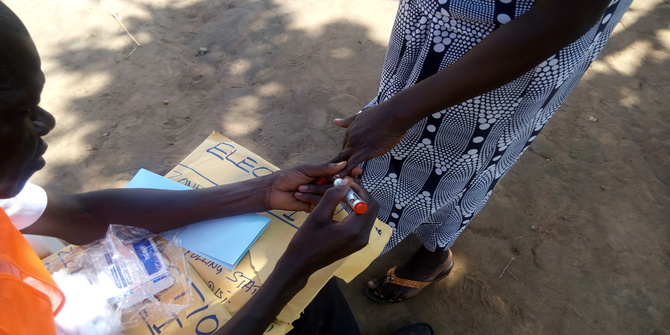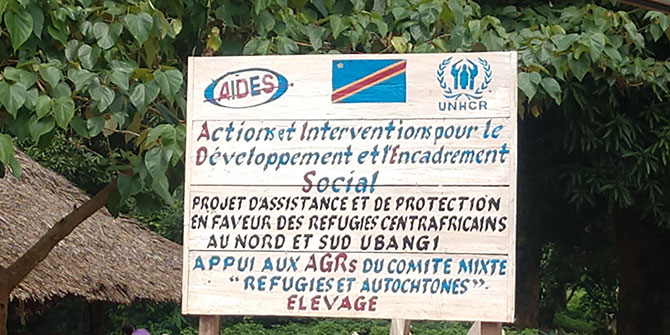Julian Hopwood reflects in this 2 part series blog on matters of evidence in both the Ugandan justice system and in popular understandings of witchcraft.
Thinking about witchcraft tends to lead to consideration of notions of what counts as evidence. Othering can function through the idea that the West deals in scientific empirical evidence, whether on crime or medicine or whatever, whereas in Africa we are mired in superstition – witchcraft is proof of this: it is not real, therefore it is impossible that empirical evidence for it exists.
I have been inspired to write this having recently heard the disturbing news that Okello Jason (all names changed), the brother of a friend of mine, has just been sentenced to five years imprisonment for fraud, on top of two years he has already spent on remand, on the strength of nothing that would count as reliable evidence in a UK court. This is Jason’s story in his own words:
On 28th May 2016 I went to collect my salary from my employer at A*** restaurant at 4:00pm. The proprietor of the business, an Indian man, refused to pay my salary claiming that during that month I did not work for one week. I had not been paid even in the previous month of April making it two months in arrears. The one week my boss claims that I didn’t work was when I fell sick and even reported to him that I’m not feeling well and would get back to work when my condition improves. I then came back after a week and continued with work normally because I was feeling better. When the month ended, I then asked for my salary since it had accumulated for two months but my boss refused to pay me saying that I missed work during that month and his policy says when someone misses work during the course of the month, he or she is not entitled to salary for that month. I was so annoyed with this and threatened to report him to the labour office. On hearing that, he became annoyed and wanted to fight me but I backed off and then left the restaurant to go home to avoid a fight. He then called me that evening and asked me to return to the restaurant and pick my money, but only if I had not yet reported him to the labour office. I then took my aunt’s motor cycle and went back to the restaurant and on reaching there, I found another two men and two women sitting together with the boss and one woman asked my boss if that is this the boy? The boss answered yes then the woman introduced herself to me as a police officer in-charge of L***** police station and she asked if I am ‘Olanya’ and I said no, my name is Okello Jason and I even showed her my identity card. She then said it could be that I was using the name Olanya to con money when my real name is not Olanya. She said she is arresting me for conning money. She came with one Nancy who claims I conned the money from her and they were looking for me. A certain witchdoctor called Jennifer claims Nancy collected the money from her to the tune of 14.7 million shillings [about £7,000] to give to an Indian called Sunil to purchase for her a second-hand lorry and she didn’t get the truck. Nancy said she gave the money to me to confirm and I handed the money to Sunil after confirming. She went on to say that I was helping to coordinate them since she cannot speak English. She also said this transaction was not written down in form of any agreement.
Jason claims Nancy’s statement is completely untrue and that he had never before met Nancy, Sunil or Jenifer. The only witness against him is Nancy. She was the prime suspect, accused by Jennifer of taking the money for the truck, arrested at the same time as Jason, but quickly released. However she is now back in prison accused of a different fraud. Sunil was arrested at the same time as Jason but released almost immediately. Jenifer’s accusation is exclusively against Nancy – she has said she knows nothing of Jason or Sunil. There is no evidence against Jason beyond Nancy’s testimony.

On the day of Jason’s last hearing there were five other cases in Gulu Magistrates Court: two of arson and three of defilement. All the other defendants apart from Jason (25) were young men under twenty. Defilement is where a man or boy has sex with a girl under 18. The defilement law was supposed to function as a way to halt child marriage and exploitative intergenerational relationships, in particular school teachers demanding sexual favours from their students in exchange for good marks. In practice it generally works differently. Two of the cases involved boys who were themselves under 18 who had been in consensual relationships with their same-age girlfriends – no one was disputing this. They were in court because the girls’ families didn’t approve of the relationships, or because the boy had not paid ‘brideprice’, though in these circumstances it works more like blackmail. In the third case it seemed unlikely that the girl was under 18 (no evidence of any of the girls’ ages was offered). In all the defilement cases a single witness was called. In one arson case there were two, while in Jason’s and the other arson case, there were no witnesses at all. No other evidence was presented. No police were called. The witnesses gave very brief and far from convincing testimony, inconsistent, inarticulate and confused, in response to questions from the prosecutor or the defence lawyer, neither of whom seemed to know much about the cases – they had perhaps skimmed the files that morning. The efforts of the defence lawyer were minimalist, failing to draw attention to the obvious weaknesses in the cases against the accused boys. In two cases, witnesses contradicted the original statements they had made to police on key issues.
One of the alleged arsonists seemed likely to be guilty as charged – he had apparently deliberately set fire to his grandmother’s hut while drunk, infuriated by the grandmother’s refusal to help his sister. In the other case there was no evidence beyond a written statement by a supposed witness and a confession by the boy that he said had been beaten out of him, and I’d have bet much on his innocence. It is common to accuse the children or grandchildren of people you don’t like of crimes. A small payment – £5-10 perhaps – to the police can ensure someone is locked up for a long time. The accused said he was 16 but looked younger. While no finding of innocence or guilt was announced by the magistrate, all the cases were adjourned; none were dismissed for lack of evidence. Two weeks later Jason was sentenced to what will be a total of seven years imprisonment.
It can be tempting to see the cruel injustices of the northern Ugandan courts as demonstrating African difference and dysfunction. Yet it is worth thinking about them in the context of the contemporary West. Through the #me too movement, Western notions of justice are struggling with matters where often the only evidence of crime or misconduct is the word of the victim. The function of notions such as truth, evidence and proof in public life are all in question. On-line mobs make death threats which sometimes turn into actual violence – often not merely without evidence but in the face of evidence. These things happen in contexts where most people have studied some science at secondary school level, and where there are vast resources available for finding evidence of crimes.
It is an interesting if disturbing experience watching ‘justice’ being administered in the absence of empirical evidence. There are several dynamics at play. The justice system has been commercialised in the sense that police, prison staff and court personnel make the bulk of their incomes from charging to release people from custody, and to a lesser extent charging to arrest and prosecute people – my guess based on observation of a number of such cases is that Jason’s employer (see part 2 of this series) paid the police to arrest him and they randomly added him into a case already underway. To work, the justice market seems to depend on a presumption of everyone accused being guilty – people have to expect to spend a long time in prison whether or not they did anything wrong if they are going to part with what are for them and their families the huge sums involved. The cost for a charge of raping a child to be dropped, evidence based or not, is around £200 in a context where a security guard, for example, is paid around £25 per month and a teacher at a government school around £60.
Corruption in public services in Uganda is pretty much a given, but arises in a context – often one in which legitimate functioning of the service is not possible. What is a justice system meant to do in a situation where good evidence, anything that might amount to proof, is unavailable? The police genuinely have no resources to investigate crimes – typically you have to pay their travel costs to get them to leave the station because there is no budget for this. Records, from birth certificates to land titles, tend to have either never existed or been lost or burnt – hut fires are extremely common whether deliberately set or not. Most financial transactions are in cash. Many people are so poor, and consequences are so unlikely, that testimony can be cheaply bought.
I wonder if the logic consequent on this inevitable weakness or absence of evidence is not something a bit like Foucault’s description of 18th Century justice in France:
… [I]t was not enough to say that a full, whole, and complete proof must be reached in order to fix a punishment. Rather, classical law said: If the sum does not add up to that minimum degree of proof on the basis of which the full and entire penalty can be applied, if the addition remains in some way uncertain, if there is simply three-quarters proof and not a full proof in the total sum, nevertheless this does not mean that one should not punish. To a three-quarters proof corresponds a three-quarters penalty, to a semi proof, a semi penalty. In other words, one is not suspected with impunity. The least element of proof, or, in any case, a certain element of proof, will be enough to entail a certain element of penalty.
If a probability of demonstrating guilt beyond reasonable doubt was required for a prosecution, and full or even substantial proof of guilt required for conviction by the Gulu magistrates, and, then they would rarely hear cases and even more rarely hand out punishment. Even the form of justice would disappear.
Find out more about the Politics of Return and our Trajectories of Displacement research projects, which are based at the Firoz Lalji Centre for Africa and funded by ESRC/AHRC.
Julian Hopwood has been based in Northern Uganda since 2006, and currently works on or provides support to a number of FLCA projects taking place there.
The views expressed in this post are those of the author and in no way reflect those of the Africa at LSE blog, the Firoz Lalji Centre for Africa or the London School of Economics and Political Science.





